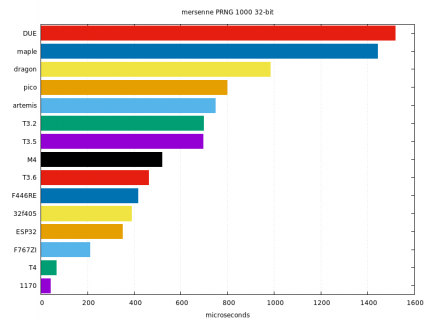I was involved in the testing of wandersons Entropy library ver 0.7 in June of 2013
I provided 4, 1 MB data sets from an Uno R3, an Uno clone and a Mega 2560 clone.
Wanderson emailed me and told me that my data was valid.
It was my intention, by placing the array generator in setup to force a new set every time
the device was powered up to generate a new set of PRNG based numbers in the array.
My personal intention is to use the PRNG data to insure a different offset into the array table
every time based on using the last used PRNG data to make a new randomSeed() number
available for use for choosing the next array number position in the array.
While my thoughts/methods might be incorrect..
They seem to make sense to me however not knowing how the numbers are used in the OP's code
might well invalidate my simple concept.
The Arduino thread is here:
http://forum.arduino.cc/index.php/topic,108380.0.html
and the data is this:
I have generated 1,000,000 bytes of entropy on four different Arduino's so far...
Here is a summary of the initial results.
ID Device Type Sample Size Entropy Chi square P-value
1 Arduino Uno R3 DIP 1,000,000 7.999797 281.39 0.1231
3 Arduino Uno R3 DIP 1,000,000 7.999819 251.38 0.5524
3 Arduino Uno SMD 1,000,000 7.999809 265.27 0.3163
4 Arduino Mega R3 SMD 1,000,000 7.999813 258.51 0.4268
Doc


